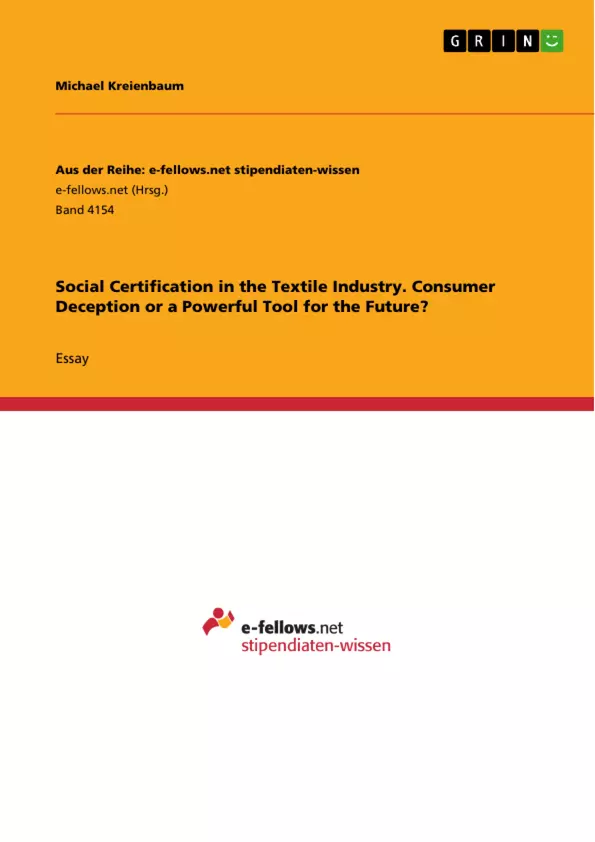The textile industry is particularly prone to human rights abuses. Even though several catastrophic events have made news headlines, the exact impact of one’s apparel purchasing is unknown to most consumers. Effective certification aimed at informing consumers could increase consumers’ awareness and influence their purchasing behavior, which in the end could alter company behavior and improve the human rights conditions for hundreds of thousands of workers.
However, introducing effective and practical certification is complicated, mostly because the numerous stakeholders have different interests that slow down progress.
Thus, this essay develops the “4I-Framework for Promotive Certification”, aimed at overcoming the problems and challenges of certification. This holistic framework, consisting of the pillars Independence, Intelligibility, Inferability, and Integration, provides a theoretical blueprint for social certification in the garment industry.
Inhaltsverzeichnis (Table of Contents)
- Executive Summary
- BHR Issues in the Garment Industry and the Role of Certification
- The status quo in the garment industry
- Certificates and their role in the context of garment
- The Problem with Certification
- Stakeholder analysis – interest conflicts and power dynamics
- The shortcomings of certification
- The role of the state
- Solution Framework Proposal
Zielsetzung und Themenschwerpunkte (Objectives and Key Themes)
This essay delves into the human rights issues prevalent within the textile industry, focusing on the effectiveness and challenges of social certification as a tool to improve working conditions for garment workers. It explores the shortcomings of existing certification schemes and proposes a new framework for promoting effective certification in the garment industry.
- Human Rights Abuses in the Garment Industry
- The Role of Certification in Promoting Human Rights
- Challenges and Shortcomings of Existing Certification Schemes
- Stakeholder Interests and Power Dynamics in the Textile Industry
- Developing a Framework for Effective Social Certification
Zusammenfassung der Kapitel (Chapter Summaries)
- Executive Summary: This chapter introduces the topic of human rights abuses in the textile industry and highlights the need for effective certification to inform consumers and influence company behavior. It outlines the key issues and challenges faced by existing certification schemes and introduces the proposed "41-Framework for Promotive Certification."
- BHR Issues in the Garment Industry and the Role of Certification: This chapter provides an overview of the garment industry's status quo, highlighting the environmental and human rights challenges associated with fast fashion. It examines the prevalence of labor rights violations, such as low wages, unsafe working conditions, and forced labor, and explores the role of certification in addressing these issues. It also discusses the emergence of various certificates, both ecological and social, and their impact on the industry.
- The Problem with Certification: This chapter delves into the shortcomings of existing certification schemes, analyzing the various stakeholder interests and power dynamics at play. It examines the perspectives of workers, suppliers, companies, consumers, and states in relation to certification. The chapter also highlights the need for a more effective and holistic approach to certification.
Schlüsselwörter (Keywords)
This essay focuses on key concepts such as human rights, social certification, garment industry, stakeholder analysis, fast fashion, supply chain transparency, and ethical consumption. It explores the challenges of implementing effective certification schemes in a complex industry characterized by power imbalances and conflicting interests.
Frequently Asked Questions about Social Certification in Textiles
What is the "4I-Framework for Promotive Certification"?
It is a holistic framework proposed to improve certification, consisting of four pillars: Independence, Intelligibility, Inferability, and Integration.
Why is certification in the garment industry so complex?
The involvement of numerous stakeholders (workers, suppliers, companies, states) with conflicting interests and power dynamics slows down progress.
What are the main human rights issues in the textile industry?
Common abuses include low wages, unsafe working conditions, forced labor, and child labor, often exacerbated by "fast fashion" demands.
How can certification influence consumer behavior?
Effective certification informs consumers about the social impact of their purchases, potentially shifting demand toward ethically produced apparel.
What role should the state play in social certification?
The essay explores how state intervention could standardize certification and ensure accountability across complex global supply chains.
- Quote paper
- Michael Kreienbaum (Author), 2022, Social Certification in the Textile Industry. Consumer Deception or a Powerful Tool for the Future?, Munich, GRIN Verlag, https://www.grin.com/document/1257668



